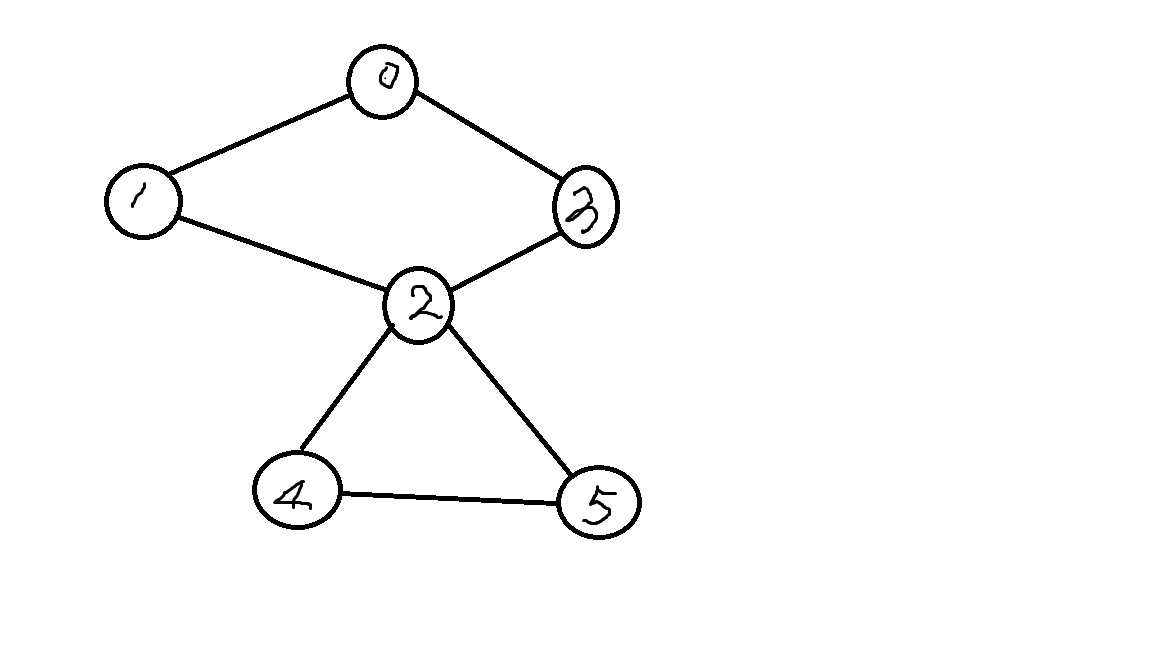标签:art using ext getch update dir temp nod 常用
小小分个类
这里推荐这篇博客:[https://blog.csdn.net/mengxiang000000/article/details/51672725]
由题可得,受欢迎的奶牛只有可能是图中唯一的出度为零的强连通分量中的所有奶牛,所以若出现两个以上出度为0的强连通分量则不存在明星奶牛,因为那几个出度为零的分量的爱慕无法传递出去。那唯一的分量能受到其他分量的爱慕同时在分量内相互传递,所以该分量中的所有奶牛都是明星。
#include<bits/stdc++.h>
#define INF 1000001
using namespace std;
int p=0,top=0,inde=0,maxn=0,block=0,n,m,sum=0;
int head[INF],aa[INF],dfn[INF],vis[INF],low[INF],book[INF],ans[INF],dis[INF];
int used[INF],deg[INF],stac[INF],x[INF],y[INF];
struct node
{
int to,next,val;
}a[INF];
void add(int u,int v)
{
a[++p].next=head[u];
head[u]=p;
a[p].to=v;
}
void tarjan(int u)
{
dfn[u]=++inde;
low[u]=inde;
book[u]=1;stac[++top]=u;
for (int i=head[u];i;i=a[i].next)
{
int ne=a[i].to;
if (!dfn[ne])
{
tarjan(ne);
low[u]=min(low[u],low[ne]);
}
else if(book[ne])
low[u]=min(low[u],dfn[ne]);
}
if (low[u]==dfn[u])
{
++block;
while (stac[top+1]!=u)
{
vis[stac[top]]=block;
book[stac[top]]=0;
ans[block]++;
top--;
}
}
}
int main()
{
scanf("%d%d",&n,&m);
for (int i=1;i<=m;i++)
{
scanf("%d%d",&x[i],&y[i]);
add(x[i],y[i]);
}
for (int i=1;i<=n;i++)
{
if (!dfn[i])
tarjan(i);
}
/*for (int i=1;i<=m;i++)
{
if (vis[x[i]]!=vis[y[i]])
{
deg[vis[x[i]]]++;
}
}*/
for (int i=1;i<=n;i++)
{
for (int j=head[i];j;j=a[j].next)
{
int u=a[j].to;
if (vis[i]!=vis[u])
deg[vis[i]]++;
}
}
for (int i=1;i<=block;i++)
{
if (deg[i]==0)
sum++,maxn=ans[i];
}
if (sum==1)
{
printf("%d",maxn);
return 0;
}
else printf("0");
return 0;
}
割点定义:在无向连通图中,如果将其中一个点以及所有连接该点的边去掉,图就不再连通,那么这个点就叫做割点
可参考:[https://www.cnblogs.com/collectionne/p/6847240.html]
从学tarjan的时候一直就疑惑这句代码 low[k]=min(low[k],dfn[u])为什么不换成low[u]=min(low[u],low[v])
而且这个能被hack的反例也很难找,在缩点里两种打法都能过。但是在割点里只要数据强一点就不行。
举个栗子,看下这张图:
假设按以下顺序dfs,括号里表示的是回溯的过程
0-1-2-3-0(-3-2)-4-5-2(-5-4-2)-5(-2-1-0)-3(-0)
low和dfn比较:low[0]=low[1]=low[2]=low[3]=0
low[4]=low[5]=2
low和low比较:全部都是0…
问题出在low[5]上,如果是low[5]和dfn[2]比较low[5]=2,如果是和low[2]比较,low[5]=0
当low[5]=2的时候,2判断是割点,当low[5]=0的时候,2判断就不是割点了。
而实际上2是割点。
这里是模板题链接[https://www.luogu.com.cn/problem/P3388]
#include<bits/stdc++.h>
using namespace std;
int dfn[200010],low[200010],p,ans,n,m,used[200010],head[200010],inde;
struct node
{
int to,next,num;
}e[200010];
void add(int u,int v)
{
e[++p].next=head[u];
head[u]=p;
e[p].to=v;
}
void dfs(int u,int fa)
{
dfn[u]=low[u]=++inde;
int son=0;
for (int i=head[u];i;i=e[i].next)
{
int v=e[i].to;
if (!dfn[v])
{
son++;
dfs(v,u);
low[u]=min(low[u],low[v]);
if (low[v]>=dfn[u]&&!used[u])
ans++,used[u]=1;
}
else if(v!=fa)
low[u]=min(low[u],low[v]);
}
if (fa<0&&son==1) ans--,used[u]=0;
}
int main()
{
scanf("%d%d",&n,&m);
for (int i=1;i<=m;i++)
{
int x,y;
scanf("%d%d",&x,&y);
add(x,y),add(y,x);
}
for (int i=1;i<=n;i++)
{
if (!dfn[i])
dfs(i,-1);
}
printf("%d\n",ans);
for (int i=1;i<=n;i++)
{
if (used[i])
printf("%d ",i);
}
return 0;
}
有三种求最短路的方法:
Floyd算法比较简单,就是暴力枚举了所有可能,将所有可能路径找遍,就知道了两点之间的最短路
void floyd()
{
for(int k=1;k<=n;k++)
for(int i=1;i<=n;i++)
for(int j=1;j<=n;j++)
dis[i][j]=min(dis[i][j],dis[i][k]+dis[k][j]);
}
需要注意的是第一层循环是枚举中间点
原因可以看这篇:[https://blog.csdn.net/weixin_42488861/article/details/97909849]
一般就是指堆优化了的dijkstra
struct node
{
long long len;
int x;
};
bool operator < (node a, node b)
{
return a.len > b.len;
}
void dijkstar()
{
d[1] = 0;
priority_queue <node> q;
node t;
t.len = 0;
t.x = 1;
q.push(t);
while (!q.empty())
{
while (!q.empty() && vis[q.top().x])
q.pop();
if (q.empty())
break;
node u = q.top();
q.pop();
long long len = u.len;
int x = u.x;
vis[x] = 1;
for (int i = head[x]; i;i = nextt[i])
{
int v = to[i];
if (len + w[i] < d[v])
{
d[v] = len + w[i];
node temp;
temp.len = d[v];
temp.x = v;
q.push(temp);
}
}
}
}
为什么SPFA可以处理负边:因为在SPFA中每一个点松弛过后说明这个点距离更近了,所以有可能通过这个点会再次优化其他点,所以将这个点入队再判断一次,而Dijkstra中是贪心的策略,每个点选择之后就不再更新,如果碰到了负边的存在就会破坏这个贪心的策略就无法处理了。
如何判断成环:
在储存边时,记录下每个点的入度,每个点入队的时候记录一次,如果入队的次数大于这个点的入度,说明从某一条路进入了两次,即该点处成环。
#include<bits/stdc++.h>
#define ll long long
#define inf 1e10
#define N 100010
#define lson rt<<1
#define rson rt<<1|1
#define FR freopen("tset.in","r",stdin)
#define FW freopen("test.out","w",stdout)
using namespace std;
ll read()
{
ll x=0;int f=1;char ch=getchar();
while (ch<‘0‘||ch>‘9‘) {if (ch==‘-‘) f=-1;ch=getchar();}
while (ch>=‘0‘&&ch<=‘9‘) {x=x*10+ch-‘0‘;ch=getchar();}
return x*f;
}
int ch[N][2],sz[N],cnt[N],key[N],f[N],rt,tot,n;
int pd(int x)
{
return ch[f[x]][1]==x;
}
void update(int x)
{
if (x)
{
sz[x]=cnt[x];
if (ch[x][0]) sz[x]+=sz[ch[x][0]];
if (ch[x][1]) sz[x]+=sz[ch[x][1]];
}
}
void clear(int x)
{
ch[x][0]=ch[x][1]=f[x]=cnt[x]=sz[x]=key[x]=0;
}
void rotate(int x)
{
int fa=f[x],ffa=f[fa],dir=pd(x);
ch[fa][dir]=ch[x][dir^1];f[ch[x][dir^1]]=fa;
ch[x][dir^1]=fa;f[fa]=x;
f[x]=ffa;
if (ffa) ch[ffa][ch[ffa][1]==fa]=x;
update(x);update(fa);
}
void Spl(int x)
{
int fa=f[x];
while (fa)
{
if (f[fa]) rotate(pd(x)==pd(fa)?fa:x);
rotate (x);rt=x;fa=f[x];
}
}
void insert(int x)
{
if (rt==0)
{
f[++tot]=0;
ch[tot][0]=ch[tot][1]=0;
key[tot]=x;rt=tot;
sz[tot]=cnt[tot]=1;
return ;
}
int nw=rt,fa=0;
while(1)
{
if (x==key[nw])//这个值之前存在
{
cnt[nw]++;
update(nw);
update(fa);
Spl(nw);break;
}
fa=nw;nw=ch[nw][x>key[nw]];
if (nw==0)//这个值之前不存在
{
f[++tot]=fa;
ch[fa][x>key[fa]]=tot;
ch[tot][1]=ch[tot][0]=0;
key[tot]=x;
sz[tot]=cnt[tot]=1;
update(fa);Spl(tot);
break;
}
}
}
int ask1(int x)
{
int nw=rt,res=0;
while(1)
{
if (x<key[nw]) nw=ch[nw][0];
else
{
if (ch[nw][0]) res+=sz[ch[nw][0]];
if (x==key[nw])
{
Spl(nw);
return res+1;
}
else res+=cnt[nw],nw=ch[nw][1];
}
}
}
int ask2(int x)
{
int nw=rt;
while (1)
{
if (ch[nw][0]&&x<=sz[ch[nw][0]])
nw=ch[nw][0];
else
{
if (ch[nw][0]) x-=sz[ch[nw][0]];
if (x<=cnt[nw]) return key[nw];
else {x-=cnt[nw];nw=ch[nw][1];}
}
}
}
int getpre()
{
int nw=ch[rt][0];
while (ch[nw][1]) nw=ch[nw][1];
return nw;
}
int getnex()
{
int nw=ch[rt][1];
while (ch[nw][0]) nw=ch[nw][0];
return nw;
}
void del(int x)
{
ask1(x);
if (cnt[rt]>1)
{
cnt[rt]--;
update(rt);
return ;
}
if (!ch[rt][0]&&!ch[rt][1])
{
clear(rt);
rt=0;
return ;
}
if (!ch[rt][0])
{
int old=rt;rt=ch[rt][1];
f[rt]=0;
clear(old);
return ;
}
if (!ch[rt][1])
{
int old=rt;rt=ch[rt][0];
f[rt]=0;
clear(old);
return ;
}
int pre=getpre(),old=rt;
Spl(pre);
ch[rt][1]=ch[old][1];
f[ch[old][1]]=rt;
clear(old);
update(rt);
}
int main()
{
n=read();
while (n--)
{
int ty=read(),x=read();
if (ty==1) insert(x);
if (ty==2) del(x);
if (ty==3) printf("%d\n",ask1(x));
if (ty==4) printf("%d\n",ask2(x));
if (ty==5)
{
insert(x);
printf("%d\n",key[getpre()]);
del(x);
}
if (ty==6)
{
insert(x);
printf("%d\n",key[getnex()]);
del(x);
}
}
}
模板题链接:[https://www.luogu.com.cn/problem/P3391]
#include<bits/stdc++.h>
#define inf 1000000000
#define ll long long
#define N 100010
#define lson rt<<1
#define rson rt<<1|1
using namespace std;
inline ll read()
{
ll x=0,f=1;char ch=getchar();
while (ch<‘0‘||ch>‘9‘) {if (ch==‘-‘) f=-1;ch=getchar();}
while (ch>=‘0‘&&ch<=‘9‘) x=x*10+ch-‘0‘,ch=getchar();
return x*f;
}
int ch[N][2],sz[N],cnt[N],key[N],f[N],root,tot,n,a[N],tag[N],m;
void update(int x) {sz[x]=sz[ch[x][0]]+sz[ch[x][1]]+1;}
int pd(int x) {return ch[f[x]][1]==x;}
void pushdown(int x)
{
if (x&&tag[x])
{
tag[ch[x][0]]^=1;tag[ch[x][1]]^=1;
swap(ch[x][0],ch[x][1]);
tag[x]=0;
}
}
int build(int l,int r,int fa)
{
if (l>r) return 0;
int mid=(l+r)>>1;
int now=++tot;
key[now]=a[mid];f[now]=fa;tag[now]=0;
int ls=build(l,mid-1,now),rs=build(mid+1,r,now);
ch[now][0]=ls,ch[now][1]=rs;
update(now);
return now;
}
void rotate(int x)
{
pushdown(f[x]);pushdown(x);
int old=f[x],olf=f[old],dir=pd(x);
ch[old][dir]=ch[x][dir^1];f[ch[x][dir^1]]=old;
ch[x][dir^1]=old;f[old]=x;
f[x]=olf;if (olf) ch[olf][ch[olf][1]==old]=x;
update(old);update(x);
}
void Spl(int x,int goal)
{
int fa=f[x];
while (fa!=goal)
{
if (f[fa]!=goal) rotate(pd(x)==pd(fa)?fa:x);
rotate(x);if (!goal) root=x;fa=f[x];
}
}
int ask(int x)
{
int now=root;
while (1)
{
pushdown(now);
if (x<=sz[ch[now][0]]) now=ch[now][0];
else
{
x-=sz[ch[now][0]]+1;
if (!x) return now;
now=ch[now][1];
}
}
}
void print(int x)
{
pushdown(x);
if (ch[x][0]) print(ch[x][0]);
if (key[x]!=-1e9&&key[x]!=1e9)
printf("%d ",key[x]);
if (ch[x][1]) print(ch[x][1]);
}
int main()
{
n=read(),m=read();
a[1]=-1e9,a[n+2]=1e9;
for (int i=1;i<=n;i++) a[i+1]=i;
root=build(1,n+2,0);
for (int i=1;i<=m;i++)
{
int l=read(),r=read();
int aa=ask(l),bb=ask(r+2);
Spl(aa,0),Spl(bb,aa);
tag[ch[ch[root][1]][0]]^=1;
}
print(root);
}
逆元,求逆元,判断两直线相交都放在了[https://www.cnblogs.com/71-111/p/9745026.html]
标签:art using ext getch update dir temp nod 常用
原文地址:https://www.cnblogs.com/71-111/p/13906284.html